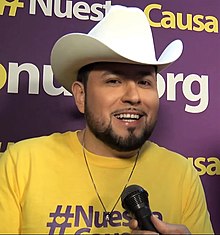Loading AI tools
American singer of Mexican ancestry (born 1981) From Wikipedia, the free encyclopedia
Roberto Tapia (born February 3, 1981) is an American singer of Mexican ancestry. He was born in San Diego, California and raised in Culiacán, Sinaloa, Mexico.[1] He adopted the Regional Mexican genre and in August 2012, his album El Muchacho hit #1 on Billboard's Top Latin Albums chart.[1] Tapia was one of three coaches on the first two seasons of La Voz Kids (The Voice Kids), a Spanish-language version of The Voice featuring American Spanish-speaking children on the Telemundo Network. He inclusively became a business man in the year of 2013, promoting restaurants, and still continuing with his singer life.
This article includes a list of general references, but it lacks sufficient corresponding inline citations. (June 2013) |
Roberto Tapia | |
|---|---|
 Tapia interviewed by Dulce Osuna in 2016 | |
| Background information | |
| Birth name | Carlos Roberto Aguirre Tapia |
| Born | February 3, 1981 San Diego, California, U.S. |
| Origin | Culiacán, Sinaloa, Mexico |
| Genres | Banda, Pacific Norteño, Mariachi |
| Occupation(s) | Singer-songwriter, record producer |
| Years active | 2008–present |
| Labels | Universal Music Group (2008-present) |
| Website | Universal Music/Roberto Tapia Página oficial |
Hailing from Lake Forest, California, Tapia's parents migrated to the United States before his birth. Tapia was born in San Diego. His family then decided to relocate to Mexico. Tapia spent much of his youth in Culiacán, Sinaloa, where, at age 9, he entered the Difocur School of music in Culiacan, now known as the Instituto Sinaloense de Cultura (ISIC).[1] Tapia specialized in clarinet,[1] but also learned guitar and percussion instruments. During this time, Tapia gained public playing experience by performing with acts such as the Symphony of Sinaloa.
At 13, the Tapia family again migrated to the US. Initially reluctant, Tapia was convinced by family and friends to perform at local venues such as dance halls and receptions.[1] Before signing with a professional label, Tapia went door to door at record shops attempting to sell his recordings. At 17, Tapia's professional debut performance came in Tijuana, Baja California alongside fellow Sinaloan artist, El Lobito de Sinaloa.[1] Tapia signed with Sony International and began his first album, blending his regional Norteña music with hints of electronica and hip hop.[1]
Roberto Tapia performances include the Nokia Theater in Los Angeles, California and the Oregon Convention Center in Portland.
He appeared on Latin Billboard Awards, LATV, and Universal Music Latino.
In 2011, Tapia appeared at the Plaza Mexico in Lynwood, CA to celebrate Mexico's Independence.
In honor of his hometown, Roberto performed at El Palanque Culiacán to celebrate the Feria Ganadera de Culiacán (Culiacán Cattle Fair), an annual traditional festival celebrating the Mexican Revolution, where everyone shares music, culture and food.
Released: March 18, 2002
Released: January 29, 2008
Released: May 26, 2009 The ballad "El Nino de la Tuna" described Chapo Guzman’s life story and was his first hit single.
Released: September 7, 2010
Released: October 11, 2011. While this album included narcocorridos, the related death of his cousin reduced his use of such lyrics.
Recorded during his sold-out concert at the Los Angeles Nokia Theatre. This album was awarded the Regional Mexican Album and Top Latin Albums in 2011.
Released Date: July 24, 2012 El Muchacho reached first place in the “Hot Latin Albums” and “Regional Mexican Sales” Billboard charts. El Muchacho earned titles including Top Latin Albums, Regional Mexican Albums, The Billboard 200 and Top Latin Albums. Los Premios de la Radio (The Radio Awards) nominated Roberto Tapia as Artist of the year, male artist of the year and the best song with banda ‘Mirando al Cielo’ in 2012.
Seamless Wikipedia browsing. On steroids.
Every time you click a link to Wikipedia, Wiktionary or Wikiquote in your browser's search results, it will show the modern Wikiwand interface.
Wikiwand extension is a five stars, simple, with minimum permission required to keep your browsing private, safe and transparent.